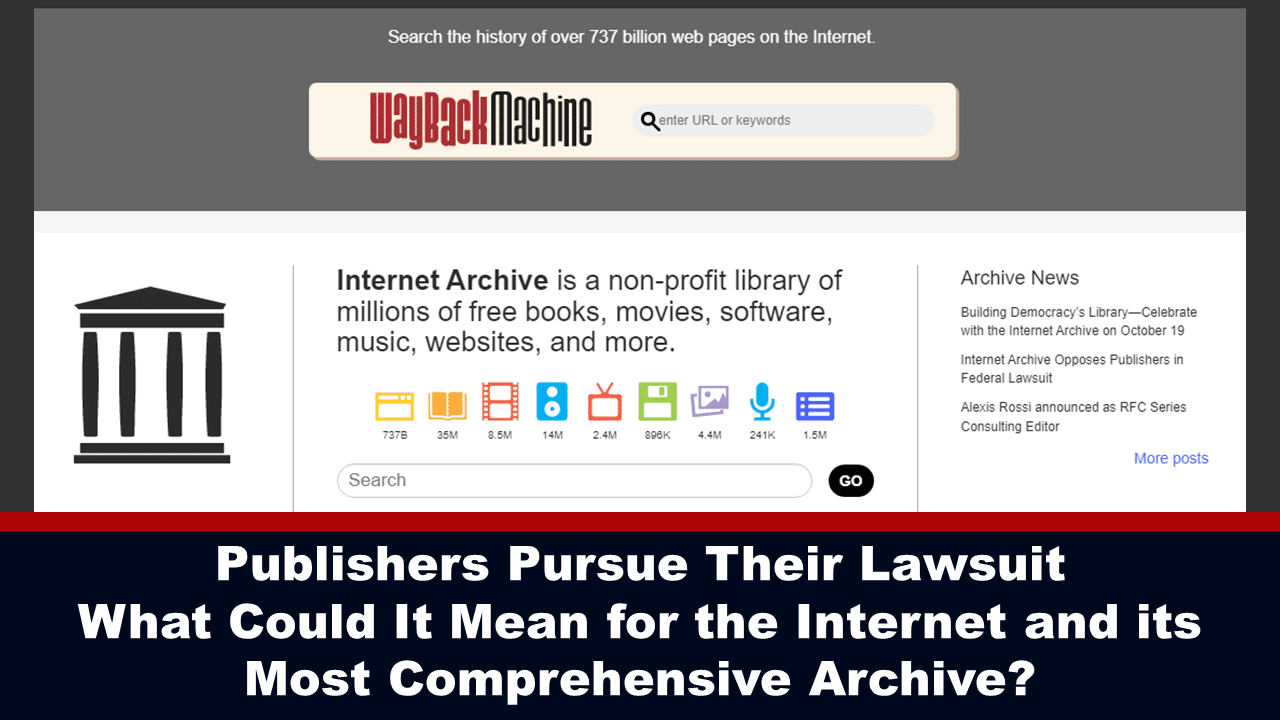Two and a half years ago, the Internet Archive (“IA”) made a decision that pissed off a lot of writers—and embroiled it in a lawsuit that many netizens fear could weaken the archive, its finances, and its services long into the future.
At the time, prominent authors spoke out against the IA’s National Emergency Library. IA started up the emergency library when bookstores and libraries closed their doors in March 2020 due to the “pandemic.” Many writers called it “piracy” and condemned the archive for allegedly stealing from creators.
More than two months after the National Emergency Library kicked off, Hachette Book Group, HarperCollins, Penguin Random House, and John Wiley & Sons (all members of the Association of American Publishers) sued the Internet Archive. In response, the archive ended the National Emergency Library a little earlier than planned, on 11 June 2020.
Let’s not lose touch…Your Government and Big Tech are actively trying to censor the information reported by The Exposé to serve their own needs. Subscribe to our emails now to make sure you receive the latest uncensored news in your inbox…
Since the publishers’ suit was filed, many of the authors who had protested the archive have deleted their tweets or released statements explaining they’ve changed their minds.
But the lawsuit is ongoing – and it’s recently escalated. We may find out sooner than later whether the beloved digital non-profit will prevail in its fight against some of the world’s biggest publishers.
Fears persist that the uncertainties of this case could cripple the archive and, subsequently, the myriad services it offers to the 1.5 million people who visit it every day. In addition to lending books digitally, the Internet Archive hosts the Wayback Machine, a tool that has chronicled internet history since 1996. The concern is that if legal costs drain the archive of its funds, all of its services could be affected. Users of the site and digital archivists have compared the potential loss of the archive’s services to the burning of the Library of Alexandria.
If even authors themselves appear to be backing away from the battle, why are publishers continuing the suit – and what could it really mean for the internet and its most comprehensive archive?
Read more: Could the Internet Archive Go Out Like Napster? Slate, 12 September 2022

The Expose Urgently Needs Your Help…
Can you please help to keep the lights on with The Expose’s honest, reliable, powerful and truthful journalism?
Your Government & Big Tech organisations
try to silence & shut down The Expose.
So we need your help to ensure
we can continue to bring you the
facts the mainstream refuses to.
The government does not fund us
to publish lies and propaganda on their
behalf like the Mainstream Media.
Instead, we rely solely on your support. So
please support us in our efforts to bring
you honest, reliable, investigative journalism
today. It’s secure, quick and easy.
Please choose your preferred method below to show your support.
Categories: Breaking News, World News

Your biased article is typical of those who have no understanding of copyright law. Internet Archive is providing unlimited downloads of digital books without permission from the authors or publishers. That’s copyright infringement. Period. It’s also piracy and theft. Internet Archive must compensate every single author for every single stolen work. As an author who has had books pirated and hundreds of thousands of illegal downloads, I hope Internet Archive and all of the piracy sites like it are permanently taken down.
Surely there are far more books, articles and video clips in that library that are not subject to copyright law. These works would then be lost forever. Seems like money is the root of all evil again.
I would agree with you, if I had not found this on You Tube. https://www.youtube.com/watch?v=ts1tu1BiSuY
Something about it being on You Tube gives me a bad feeling as if it is all being orchestrated; maybe collecting our data, maybe adding something to our computers if we download.
Just my view and yes, I am a synical old git.
The Internet Archive is just that a “archive” of the internet, I was around when it was first created and that is what it was created for. The only thing it did was archive different things uploaded to the Internet.
You want to complain about copyright infringement you need to direct that to the ones doing the infringements not the program that backs up things so you don’t lose it.
Could the writers of the articles not swear in the articles? “Annoyed” would be a suitable word, even if it’s considered by some to be a very boring word.
Here’s an example of how important the Wayback machine is.
In their document “Understanding mRNA COVID-19 Vaccines” the CDC made the (false) claim that “Our cells break down mRNA from these vaccines and get rid of it within a few days after vaccination.”
The Wayback machine shows that this claim has been quietly removed. If you compare
https://www.cdc.gov/coronavirus/2019-ncov/vaccines/different-vaccines/mrna.html
with
https://web.archive.org/web/20220722141942/https://www.cdc.gov/coronavirus/2019-ncov/vaccines/different-vaccines/mrna.html
the section The mRNA and the spike protein do not last long in the body has been removed.
Both versions claim to have been updated on July 15, 2022 so there;s clearly been an attempt to rewrite history.
May we now assume that
Perhaps recent research summarised in
https://philharper.substack.com/p/the-mccullough-paper
will answer these questions.